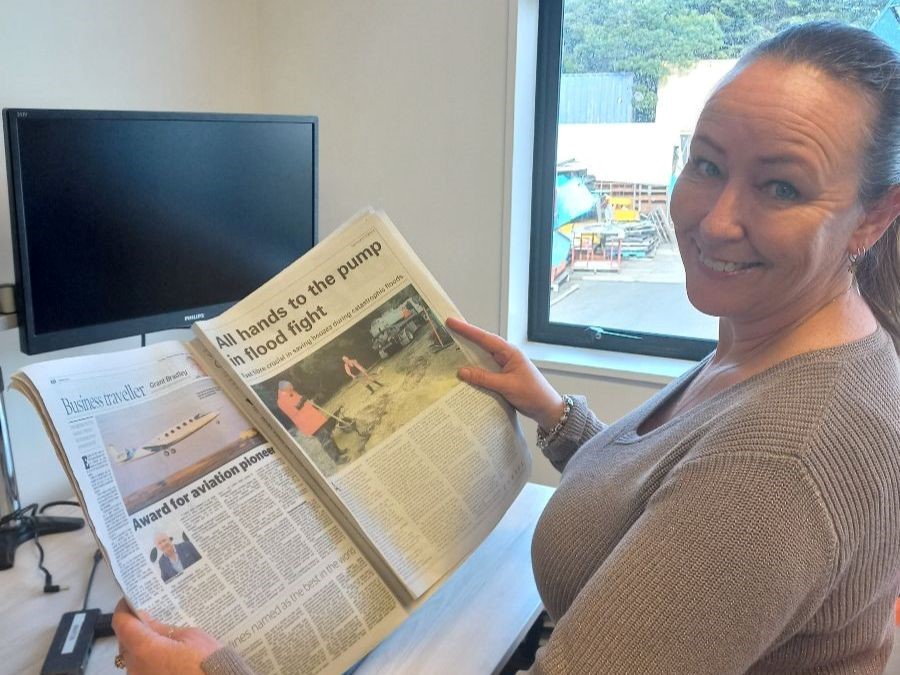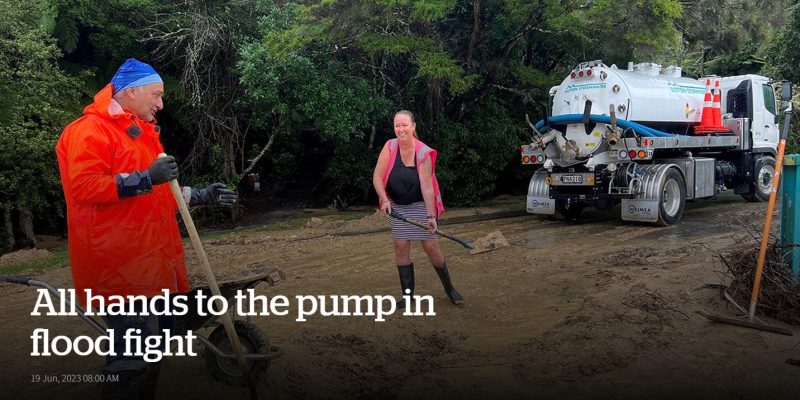Originally published in The NZ Herald.
As Auckland was being battered yet again by rain, a group of office workers went beyond the call of duty to help people whose homes and properties were being threatened by rising flood waters.
Tracy Hill and some in her team at the Auckland-based stormwater maintenance company, Dutton Stormwater, left their desks, donned gumboots and rain jackets and headed into the storm to join forces with their mobile service crews.
“We were inundated with calls, more than we could respond to,” says Hill, the company’s general manager. “At the peak we attended more than 58 call-outs; our operations manager, myself and some of our 16 office staff were out there. We were all hands-on deck and helped pump water and clear away rubbish and debris.”
Hill was relating events that unfolded during catastrophic flooding over Auckland Anniversary weekend in January: In one incident Dutton crews spent hours vacuuming and pumping more than 1.5 million litres of water from an inner-city carpark where dozens of cars were trapped.
They were also called to many residential areas where houses and streets were under threat.
An example over anniversary weekend came following a desperate call for help from a family in Sunnynook, worried flood waters were about to swamp their home.
“We got there at 8.30 at night and set up a pump to divert the water,” Hill says. “The water was starting to come into the downstairs lounge and it took nearly two hours to save the house. I’m sure if we hadn’t got there as quickly as we did, it would have flooded.”
Having the right IT systems, enabled by strong connectivity, played a key part in their ability to respond at short notice, says Hill. It allowed near-instant communication with its maintenance crews, enabling them to be quickly sent to where they were needed.
“All our customer locations are on our computer system. From the office we are able to instantly upload a job to their phones so our crews know in real time where they need to be. We can also upload maps of the drainage systems at all locations and show who the contacts are.
“On the day of the floods, the crew’s whole work order changed, but we were able to instantly redirect them to the trouble spots so they could get there as quick as possible,” she says. “For that we need high-speed fibre, we wouldn’t be able to do it without that connectivity.
“The alternative is to rely on making a phone call (which might not be answered) or, like back in the day, send crews out with a manila folder full of these details. Under that system, in an event like the floods they would have had to come back to the office to get new orders, thus considerably delaying response time.”

Head of business and networks at Chorus, Dean Pointon, says Dutton Stormwater shows a business fibre connection can champion productivity in a small business environment. “It offers speed, consistency and reliability for an internet connection – all of which are crucial to the success of any business. The right fibre connection can enable new ways of doing things and ensure a business keeps up with its productivity needs.”
The company was founded by Ed Dutton in 2009. Initially operating from a single van, today the business has 10 vacuum trucks, 15 other vehicles and employs 37 staff. It has one truck servicing stormwater devices across the country and recently opened a branch in Christchurch.
“Now we operate 95 per cent paperless and all our systems and databases are stored on a remote server which we need access to constantly, without lag time. Any interruption to our connection is extremely disruptive and costly,” says Hill.
“While our field crew would be able to continue working using data, our office staff are severely affected as switching to slower mobile connections reduces our efficiency.”
In 2017 the company developed its own software system called Foxy to store customer details and service reports. It now includes a planning and scheduling management system and Foxy mobile which is used by the crew to complete their service and health and safety reports.
“For the service reports alone we are downloading, checking and sending approximately 1500 reports to customers every month,” Hill says. “Some customers require the reports to be uploaded to their own secure systems and portals, all of which require strong connectivity.
“Fast connection speeds means we are able to deliver our services efficiently, lower our overheads and offer the best available rates.”


